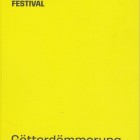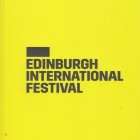Götterdämmerung 2019Edinburgh International Festival
Read more about the opera Twilight of the Gods
Wagner's Ring cycle, performed over four years during the Edinburgh International Festival, in concert form in the Usher Hall, came to an end with Götterdämmerung, under the baton of Sir Andrew Davis leading the Royal Scottish National Orchestra. Originally it was intended to employ a different company for each evening - Das Rheingold in 2016 featured Valery Gergiev and the Mariinsky, with Sir Mark Elder conducting the Hallé in Siegfried at the 2018 Festival. However, such was the success of the reunion of Sir Andrew Davis with the RSNO for Die Walküre in 2017 that they were immediately invited back for the finale. The performance didn't linger, but was never rushed. It was beautifully paced, with some particularly fine playing from the woodwinds.
Davis drew a remarkable contribution from the international cast, headed by the tireless Christine Goerke, in top form as an outstanding Brünnhilde. Burkhard Fritz, made his British debut as an effective Siegfried. Amber Wagner and Josef Wagner (not related) were unusually sympathetic as the Gibichung siblings. Ain Anger made a positive impression as Hagen, while Samuel Youn, with less material to work with than last year, was still a dominant figure as Alberich.
The Arbroath mezzo Karen Cargill, frequently seen at the Met nowadays, doubled as Second Norn in the Prologue and as Waltraute. She was in wonderful form, especially when performing against Goerke, where their first act argument sprang to life. Scots also noted the excellent performance of Catriona Morison (Wellgunde) following up last year's recital with her Festival operatic debut and singing her first Wagner part. Even the short role of Third Norn received luxury casting, being taken by the Canadian soprano Erin Wall, a Festival favourite not otherwise engaged this year.
Reservations related to the surtitles, which from many seats were too small for older audience members to read. One also wondered whether some modest use of props could have helped to highlight stage actions, such as tankards when actors were making toasts, or spears at the oath-taking.
This event was a fitting climax to the Ring project, which was greeted with a degree of doubt at the outset, but which has developed into something of a triumph. With many great contributions, it was perhaps dominated by the magnetic interpretation of Brünnhilde by Christine Goerke.
The 2019 Festival programme
The opera programme for the 2019 Edinburgh International Festival included two fully-staged productions. The Komische Opera, Berlin, last here in 2015, brought a staging by director Barrie Kosky of Tchaikovsky's Eugene Onegin. Scottish Opera's contribution was the European premiere of the noted American composer Missy Mazzoli's interpretation of Breaking the Waves, a bleak view of life in the Scottish Highlands and Islands, as depicted in the 1996 film by Lars von Trier.
The series of notable concert performances featured Götterdämmerung, bringing to a climax the Festival's four-year cycle of Wagner's Ring. A second Berlin company, the Deutsche Oper, led by its Scottish conductor, Donald Runnicles, brought Puccini's rare early Manon Lescaut featuring the Met's star soprano Sondra Radvanovsky in the title role. Iestyn Davies led the cast in a performance of Gluck's Orfeo ed Euridice.
There was a rare and wonderful Elgar oratorio, The Kingdom, with the Edinburgh Festival Chorus joined by Martyn Brabbins and the Hallé. Even more unusual was the celebration of Leonard Bernstein's centenary - a concert presentation by Sir John Eliot Gardiner and the Scottish Chamber Orchestra of his great musical West Side Siory. In addition, the opening concert showed off the Los Angeles Philharmonic and their charismatic conductor Gustavo Dudamel in Mahler's inspiring 'Resurrection' Symphony. And the Orchestre de Paris bring Britten's War Requiem.
Performance Cast
- First Norn
- Second Norn
- Third Norn
- Brünnhilde Siegfried's lover
- Siegfried
- Gunther a Gibichung
- Hagen son of Alberich
- Gutrune a Gibichung, Gunther's sister
- Waltraute a Valkyrie, Brünnhilde's sister
- Alberich a Nibelung
- Woglinde a Rhinemaiden
- Wellgunde a Rhinemaiden
- Flosshilde a Rhinemaiden

